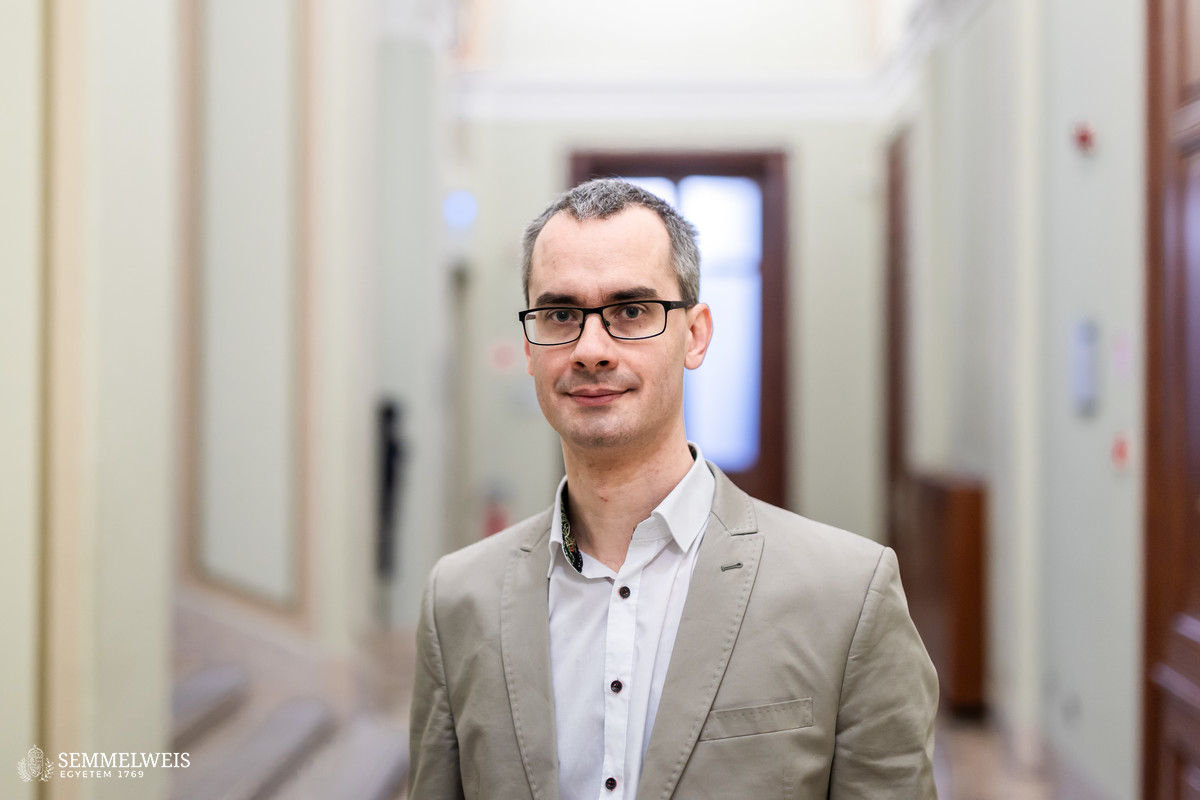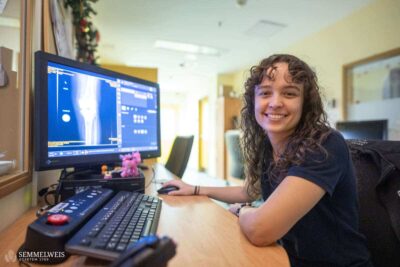He graduated from Semmelweis University, obtained his PhD at the Heart and Vascular Center in Városmajor, but decided to start working in medical and healthcare software development, recalls the beginnings Dr. Zsolt Bagyura, Director of the Institute of Clinical Data Service. As he explains, this had its origins in his PhD studies, as medicine and informatics are now ‘inseparable’. “I was drawn into this world,” he says. He stayed part-time as a researcher at the clinic, runs the Budakalász Study (a cardiovascular cohort study of residents residing in a town near Budapest), but has previously also worked in software development for various international medical informatics companies, where he contributed to developing software used by the medical staff. He has considerable experience in hospital administration systems and the databases behind them, and has also led the development of a software system for register building in clinical research.
 He considers the university’s involvement in the EHDEN European Union call for proposals as a direct precursor of the institute. The aim of this, he explained, was to create a repository of data from routine clinical practice, structured according to a standardized, uniform scheme. “If we take the same approach to data entry across the approximately 200 European patient care institutions participating in the tender, we will have a database that is basically searchable in a uniform way,” he adds. “With this data warehouse, we not only have better access to clinical data, but we also join a network where anyone can initiate research and join existing research, which is also a very good opportunity,” he notes. “Also, there are a wide range of tools, methods, and procedures available, which is a great advantage: as data processing is not trivial, there are many questions that can arise. There is a vibrant scientific community behind it, from whom good practices can be adopted and learned,” Dr. Zsolt Bagyura highlights.
He considers the university’s involvement in the EHDEN European Union call for proposals as a direct precursor of the institute. The aim of this, he explained, was to create a repository of data from routine clinical practice, structured according to a standardized, uniform scheme. “If we take the same approach to data entry across the approximately 200 European patient care institutions participating in the tender, we will have a database that is basically searchable in a uniform way,” he adds. “With this data warehouse, we not only have better access to clinical data, but we also join a network where anyone can initiate research and join existing research, which is also a very good opportunity,” he notes. “Also, there are a wide range of tools, methods, and procedures available, which is a great advantage: as data processing is not trivial, there are many questions that can arise. There is a vibrant scientific community behind it, from whom good practices can be adopted and learned,” Dr. Zsolt Bagyura highlights.
The secondary use of such data collected in the course of patient care (Real Word Evidence, RWE) is gaining importance, for example in the case of analyses on the efficacy of drugs, side effects, or epidemiological analyses involving large numbers of cases.
“Supported by Rector Dr. Béla Merkely, the idea was to further develop this database, and to continuously improve it and make it live. The idea also arose to have an institute to maintain the database if someone wants to research it, either from within the university or as an external partner. It is important to have a provider who also develops the methodology,” Dr. Zsolt Bagyura points out, recalling the reasons for setting up the institute. “This is only partially an IT problem, it is also important to understand our own processes from a medical, clinical point of view,” he adds. Dr. Zsolt Bagyura would highlight the word ‘service’ in the name of the institute, as its aim is to ensure that the researchers do not need to know where and how the required data is generated, do not need to know the IT system in depth; they just need to consult them so that they can jointly identify what data is available and help them to get it in the easiest, fastest and most compliant way. He stresses that they work in close cooperation with the Directorate General of Information Technology, especially with Director General Gábor Czinderi and Deputy Director General László Sándor.
Regarding the other tasks of the Institute of Clinical Data Service, Dr. Zsolt Bagyura highlights the significance of handling form systems used in clinics and developing these forms. Since November, the university has taken over the operation of one of the structured diagnostic systems, so user support and the development of forms have come within their scope. This system is used in several university clinics, including the Heart and Vascular Center, the Pediatric Center, as well as the Departments of Orthopedics and of Pulmonology, so it is essential to have a secure system that is located within the university, he added. They can also assist in the preparation of forms for research.
Dr. Zsolt Bagyura considers it a great success that Semmelweis University is also participating in the international program dAIbetes as a consortium partner in the framework of the Horizon2020 project. (The project’s press release is available here.) The pilot project, based on clinical data and using artificial intelligence, launched on January 1, and is a collaboration between 14 European and US universities focusing on the treatment outcomes of type 2 diabetes by developing ‘virtual twins’, integrating extensive datasets from various sources, in compliance with data protection legislation. The university’s data repository is also involved in other international collaborations: a research project is currently being led by the University of Oxford, and the institution also collaborates in the DARWIN EU project of the European Medicines Agency, which will be launched in 2024, Dr. Zsolt Bagyura adds.
Besides participating in ongoing projects and carrying out day-to-day tasks, the Institute is also currently recruiting staff. With some positions still vacant, Dr. Zsolt Bagyura welcomes applications from university citizens who wish to participate in the projects.
Péter Pogrányi
Translation: Judit Szabados-Dőtsch
Photo: Bálint Barta – Semmelweis University; iStock



